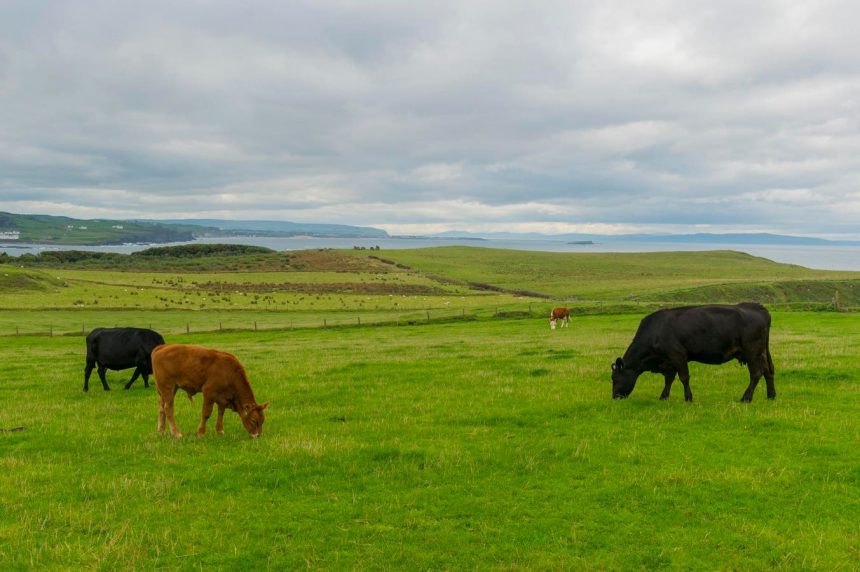The seemingly innocuous act of a cow belching releases methane, a potent greenhouse gas, into the atmosphere. This methane, a byproduct of the cow’s complex digestive process, contributes significantly to climate change, warming the planet at a rate 82 times faster than carbon dioxide over a 20-year period. Cows, along with other ruminant animals, rely on a symbiotic relationship with trillions of microbes in their stomachs to break down the fibrous plant matter they consume. This microbial digestion, while essential for the cow’s survival, produces vast quantities of methane, posing a significant environmental challenge. Scientists across various disciplines are actively exploring innovative strategies to mitigate methane emissions from livestock, aiming to balance the need for food production with environmental sustainability.
One primary area of focus involves modifying cattle diets. While fiber-rich grasses and hay are cost-effective feed options, they contribute significantly to methane production. Shifting towards grain-based diets can reduce methane output, but this approach faces economic hurdles for farmers and may not be suitable for free-ranging cattle. Finding the optimal balance between grains and fiber to ensure both animal health and reduced emissions remains a complex task. The logistical challenges of implementing dietary changes for vast herds, especially those not under direct human management, further complicate this approach.
Another avenue of research centers on feed additives, substances added to cattle feed in small quantities to alter digestive processes and reduce methane emissions. 3-NOP (Bovaer) is one such additive, shown to reduce methane emissions by a significant percentage. Seaweed, particularly its active ingredient bromoform, has also garnered attention as a potential additive. However, concerns regarding heavy metal contamination, iodine toxicity, and potential carcinogenicity associated with seaweed necessitate careful evaluation and controlled cultivation methods. While research into seaweed-based additives shows promise, addressing consumer health concerns and ensuring sustainable sourcing practices are crucial for widespread adoption. Cost remains a significant barrier to the widespread implementation of feed additives, particularly for farmers in developing countries. Innovative strategies like cooperative livestock management and government incentives are being explored to overcome these economic challenges.
Genetic selection offers a long-term solution by breeding cows with naturally lower methane emissions. Research indicates that methane production varies among cows even with identical diets and living conditions, suggesting a genetic component. Scientists are working to identify the genes responsible for lower methane emissions and selectively breed cows with these desirable traits. This approach, while promising, requires extensive research and time to achieve significant results. Similar long-term potential lies in the development of vaccines that target methane-producing microbes in the cow’s gut. Such vaccines could offer a practical solution for managing emissions from free-ranging cattle, but their development and widespread implementation are still years away.
More immediate, though arguably less practical, solutions involve wearable devices designed to capture or convert methane emissions. One such device is a mask fitted over the cow’s nose, containing a catalyst that converts methane into carbon dioxide and water. While carbon dioxide is a less potent greenhouse gas than methane, its significantly longer lifespan in the atmosphere raises concerns about the long-term environmental impact of this approach. Other experimental devices involve collecting methane burps via tubes and storing them in containers on the cow’s back. However, the logistical challenges of emptying these containers daily and the potential for methane leaks limit the feasibility of this technology.
The urgency of addressing methane emissions from livestock stems from the significant contribution of beef production to food-related climate emissions. Beef production generates considerably more emissions than plant-based protein sources, and its contribution to overall meat-related emissions is substantial. The scale of these emissions even rivals those of major fossil fuel companies, highlighting the need for industry-wide changes. While some companies have pledged to achieve net-zero emissions, the feasibility and sincerity of these claims face scrutiny. Without concerted efforts to curb methane emissions, the environmental impact of beef and dairy production is projected to increase significantly in the coming decades.
Addressing the complex issue of cow methane emissions requires a multi-pronged approach. No single technology offers a perfect solution, and the effectiveness of different strategies will vary depending on factors like climate, soil conditions, and livestock management practices. A combination of approaches, such as integrating feed additives with vaccines and improved manure management, may prove most effective. Furthermore, improving livestock efficiency, particularly in developing countries, can significantly reduce the environmental footprint of meat and dairy production. By increasing productivity per cow, fewer animals are needed to meet demand, leading to lower overall methane emissions. Finding the optimal balance between emissions reduction and productivity is a key goal for researchers.
Individual actions also play a role in mitigating the impact of cow methane emissions. Consumers in high-meat-consumption countries can contribute by reducing their red meat intake and supporting policies that promote healthy and sustainable food choices. While reducing meat consumption may not be appropriate in regions with limited access to protein, it can make a significant difference in wealthy nations. Supporting ongoing research and development, and maintaining an open mind towards various approaches, including both pasture-raised and feedlot-raised beef, are essential for finding effective and sustainable solutions. Addressing this challenge requires a global effort, with strategies tailored to the specific circumstances of different regions. Ultimately, a combination of scientific innovation, policy changes, and individual actions will be needed to effectively mitigate the impact of cow methane emissions on our planet.



